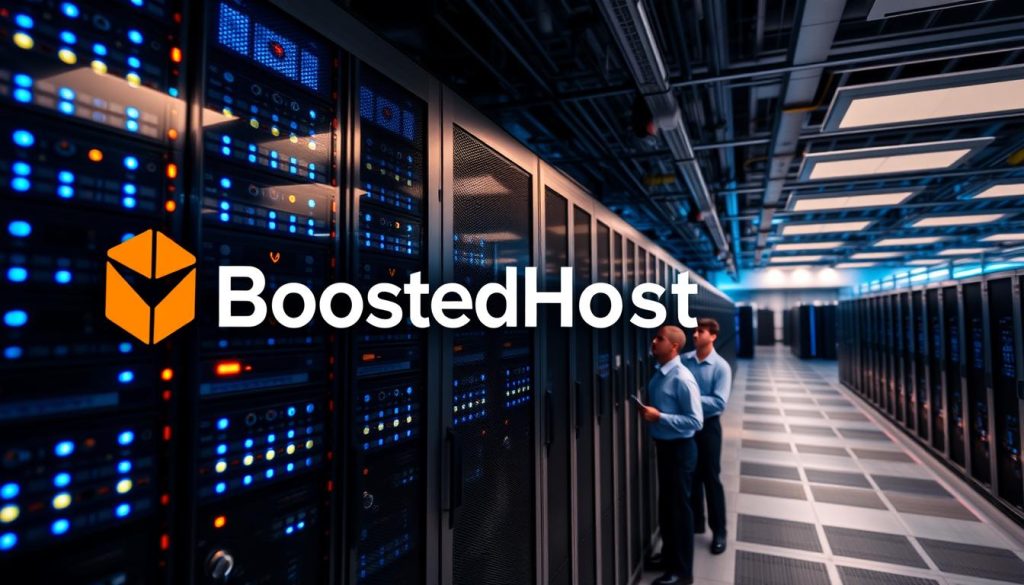We’ve felt the pressure of a slow launch and the worry of surprise renewal fees. We write this to spare you that stress. Our goal is simple: give clear, practical answers so your site runs fast and predictable.
This head-to-head review focuses on real business needs—performance, uptime, pricing, and support. We test TTFB, cache stacks, isolation, and real-world uptime. We also check what’s included in each plan and what you’ll pay per month.
We explain where a speed-first provider shines: Swiss infrastructure, LiteSpeed on NVMe, sub-200ms global TTFB, free SSL, daily backups, malware protection, and a global CDN included. We also call out the rival’s strong value, Windows hosting, and broad data centers—so you can pick the right service for your site.
Key Takeaways
- We prioritize speed, uptime, and transparent pricing for business sites.
- One provider excels at ultra-fast stacks and bundled security features.
- The other offers strong value, Windows/ASP.NET support, and global promos.
- We test real TTFB, cache performance, and uptime—not just specs.
- Choose based on tech needs: speed and transparency vs. platform breadth.
Who should read this 2025 comparison and how we evaluated the hosts
We wrote this comparison for decision makers who need predictable hosting that performs under load. We speak to owners, marketers, developers, and agencies choosing plans for real business outcomes.
Focus: page speed, uptime, and transparent pricing per month. We test provisioning, setup time, and the ease of getting a website online.
Evaluation basics: we measured page speed metrics, multi-month uptime, included features, and renewal clarity. We also checked developer tools—SSH, Git, PHP, Node.js, and Python—to ensure teams deploy fast.

- Support quality judged by resolution speed and expertise.
- Data center spread and routing for real TTFB impact.
- Intro pricing, free domain offers, and control panel experience.
“Outcomes matter more than channels—fast resolutions keep sites stable.”
| Criterion | What we measured | Business impact |
|---|---|---|
| Speed | TTFB, cache stack | Lower bounce, better conversions |
| Uptime | Monthly reliability | Less downtime, steady revenue |
| Support & setup | Provisioning, response time | Faster launches, fewer headaches |
| Plans & costs | Intro vs renewal, per month fees | Predictable budgeting |
BoostedHost vs IONOS: the quick verdict and key differences
A concise verdict helps you pick fast. We weigh speed, uptime, pricing, and tools that matter to business users. Read this to decide which hosting plan fits your launch timeline and budget.

Where BoostedHost leads
Performance-first stack: LiteSpeed on NVMe with LSCache and CloudLinux isolation delivers sub‑200ms global TTFB and 99.99% uptime. That means faster pages and fewer lost visitors.
All-included security and tools: free SSL, daily backups, malware protection, a global CDN, and Orbit AI site builder that spins up a polished website in under five minutes.
Transparent billing and rapid support: no hidden fees and 24/7 experts who resolve most issues in minutes—ideal for teams that value predictable costs and quick fixes.
Where IONOS shines
Price and platform breadth: aggressive intro pricing, free domain on many plans, and Windows/ASP.NET hosting with Plesk for legacy apps.
Global footprint and core protections: multiple data centers, 99.9% uptime guarantee, free wildcard SSL, DDoS protection, and daily backups on shared hosting.
“Choose speed and transparent uptime for mission-critical sites; choose lower intro pricing and Windows support when platform needs dictate.”
| Focus | BoostedHost | IONOS |
|---|---|---|
| Performance | LiteSpeed NVMe, LSCache — sub‑200ms TTFB | Industry stacks, solid for general hosting |
| Uptime | 99.99% SLA | 99.9% SLA |
| Included security | Free SSL, daily backups, malware protection, CDN | Wildcard SSL, DDoS protection, daily backups |
| Best for | Speed-first sites, ecommerce, agencies | Cost-conscious users, Windows/ASP.NET apps |
Our verdict: choose BoostedHost when speed, uptime, and clear billing are mission critical. Choose IONOS if you need Windows/ASP.NET support, a free domain bundled with a plan, or very low intro pricing.
Explore detailed web hosting plans to compare features and monthly costs: web hosting plans.
Performance and uptime: LiteSpeed NVMe vs industry-standard stacks
Speed is a business metric — slow pages cost conversions and trust. We focus on the stack components that move the needle for real sites. Quick wins come from server software, storage, and caching working together.
Speed metrics that matter
LiteSpeed + NVMe + LSCache lowers TTFB and speeds render times. That combo gives sub‑200ms global TTFB in typical conditions.
CloudLinux isolation reduces noisy-neighbor slowdowns on shared hosting. Consistent speed helps SEO, user experience, and conversions.
Uptime in the real world
We aim for 99.99% uptime for mission-critical sites. That level keeps checkout flows and lead forms online.
Competitors offer 99.9% SLAs and wide data center coverage. Evaluate real uptime history, not just the guarantee.
Global delivery and data center choices
Multi-location CDN points in Switzerland, the USA, Europe, and Asia cut latency for international traffic. Keeping assets near users matters more than raw bandwidth.
| Component | What it affects | Business impact |
|---|---|---|
| LiteSpeed + LSCache | TTFB, page render | Faster site loads, better SEO |
| NVMe storage | IOPS, asset delivery | Quicker database and file reads |
| CloudLinux isolation | Neighbor noise | Consistent performance on shared plans |
| Multi-location CDN | Latency for global visitors | Lower page time for users worldwide |
Pricing transparency and true cost per month
Pricing transparency matters. We publish the true monthly price so teams can compare hosting plans side by side. No fine-print surprises. No checkout bait-and-switch.
No hidden fees: SSL, backups, malware protection, and CDN included
Every plan includes essentials. Free SSL, daily backups, malware protection, and a global CDN come in the per month price. Email uses enterprise SMTP relays to protect deliverability — not fragile shared-IP mail that forces costly fixes later.
Intro vs renewal: decoding promotions, free domains, and add-ons
Promos look great at first glance. Many providers run low intro rates and include a free domain for year one. Study renewal pricing and which features jump tiers after the promo ends.
If you expect to scale to a VPS, price that path now — include bandwidth, storage, and premium support in your monthly budget.
| What you pay per month | Included with plan | Notes |
|---|---|---|
| Published monthly price | SSL, backups, CDN, malware | True cost—no checkout add-ons |
| Intro promo price | Often: free domain (year 1) | Check renewal rate and ionos offers details |
| Scale to VPS | Bandwidth, storage, support | Factor into future monthly budget |
Core features and security: what’s included out of the box
Included protections and communication tools decide whether a plan is business-ready. We look past marketing to see what a hosting plan actually bundles by default.
Free SSL, daily backups, and malware protection as table stakes
Every hosting plan should include free SSL and automated daily backups. That protects your site and shortens recovery time if something goes wrong.
Malware scanning and a global CDN keep pages fast and safe without extra monthly fees.
Email deliverability and infrastructure
Enterprise SMTP relays preserve inbox placement for order confirmations and password resets. Good email infrastructure is vital for revenue and trust.
Some entry plans include one basic email account—verify limits before you commit.
DDoS protection, isolation, and reliability
Account isolation (CloudLinux) prevents noisy neighbors from slowing your site. DDoS protection and wildcard SSL certificates add resilience as traffic grows.
- Included by default: free SSL, daily backups, malware protection, global CDN.
- Isolation: CloudLinux-style account separation for consistent performance.
- Email: enterprise SMTP relays vs. basic email accounts—check inbox guarantees.
- Verify: SSL certificate scope, backup retention, restore process, storage and inode limits.
| Item | Typical inclusion | Business impact |
|---|---|---|
| Free SSL | Yes (single or wildcard) | Secure domain and user trust |
| Daily backups | Automated retention | Fast rollback, lower downtime |
| Email deliverability | Enterprise SMTP or single account | Higher inbox rates for transactional email |
For WordPress sites, check specialized services like managed WordPress hosting that bundle LSCache and transactional email options tailored for WooCommerce.
Managed WordPress and WooCommerce hosting
Good wordpress hosting removes friction: fast pages, safe updates, and dependable email.
We run WordPress on LiteSpeed with LSCache for server-level acceleration. That improves Core Web Vitals and keeps pages steady under traffic spikes.
WP-CLI, staging, and safe auto-updates let teams ship faster and roll back when needed. Daily backups and malware protection make restores simple.
For WooCommerce, NVMe storage and account isolation keep checkout pages responsive during campaigns. Transactional email uses enterprise SMTP relays so receipts land in customer inboxes.
Competitors perform well in benchmarks and offer a 99.9% uptime guarantee. Verify which tiers include advanced caching, CDN, and staging before you commit to a plan or pay per month.
| Feature | Stack | Business impact | Included in plans |
|---|---|---|---|
| Server cache | LiteSpeed + LSCache | Faster page loads, better SEO | Yes (managed WP) |
| Dev tools | WP-CLI, staging | Safer updates, faster deploys | Yes / tiered |
| Reliability | NVMe + isolation | Responsive checkout under load | Daily backups, malware |
| Transactional email | Enterprise SMTP | Receipts reach customers | Included for ecommerce |
AI website builder and ease of use: Orbit vs traditional site builders
Orbit turns a short brief into a full site scaffold in under five minutes. We pair that speed with 24/7 expert help so launches are fast and safe. The goal is simple: get a professional website live with minimal friction.
Build a professional site in under five minutes with Orbit
Orbit generates a polished site from a short brief — layout, sections, and starter copy appear automatically. You get a working homepage, navigation, and content blocks that follow SEO-friendly patterns.
We automate DNS, SSL, and CDN setup so you avoid common launch mistakes and support tickets. That reduces time to publish and lowers the chance of configuration errors.
- Orbit speeds production — go live in minutes, not days.
- We balance AI speed with SEO and conversion best practices.
- Prefer a traditional workflow? WordPress with LSCache and staging is ready.
- For domain and control panel needs, competitors offer custom panels — Orbit is the AI-first path to production.
“A fast, reliable builder should deliver results, not just visuals.”
Developer stack, hosting types, and control panels
Developers need clarity on supported runtimes and upgrade paths before committing to a hosting plan.
We offer full dev tooling on shared web hosting and managed WordPress plans. SSH, Git, PHP version selector, Node.js, and Python are available. That keeps modern apps deployable without hacks.
Languages, frameworks, and CI/CD
Laravel, Composer, and common CI/CD patterns run smoothly. Our stack supports Laravel and developer workflows so agencies can standardize deployments across many sites.
Hosting range and upgrade paths
We cover shared hosting, managed WordPress, vps, vps hosting, cloud hosting, and dedicated hosting. Plans scale—CPU, RAM, storage, and data transfer grow with your needs.
Control and OS choices
One provider offers Linux and Windows hosting, including ASP.NET, a custom panel, and Plesk. If you require cpanel specifically, confirm it on your target plan. Control panel choice matters for workflow and migration.
| Item | Supported | Business impact |
|---|---|---|
| Runtimes | PHP, Node.js, Python | Run web apps and APIs |
| Dev tools | SSH, Git, Laravel | Faster deploys, safer rollback |
| Hosting options | Shared, VPS, cloud, dedicated | Scale from site launch to enterprise |
| Control panels | Custom panel, Plesk, cPanel (confirm) | Match your team’s workflow |
Customer support and satisfaction: speed of resolution vs breadth of channels
Quick resolution turns hosting problems into brief interruptions, not business losses. We treat customer support as a business tool. Fast fixes protect revenue and reputation.
24/7 expert support that resolves most requests in minutes
We provide 24/7 expert help that aims for first‑contact resolution. Our engineers know WordPress, WooCommerce, PHP, Node.js, and Python.
That technical depth matters. It speeds diagnosis and keeps your uptime and performance steady.
Support channels, personal consultants, and documented resources
Multiple channels help, but outcomes matter most. Phone, chat, and a Help Center reach different users and needs.
Some providers include a free personal consultant on signup and 24/7 phone access. We recommend teams test response times for their critical plans and dedicated hosting options.
- First‑contact resolution: reduces downtime and follow-ups.
- Deep expertise: engineers who fix the root cause, not only symptoms.
- Verify tools: confirm cPanel support and SLAs before migration to VPS or dedicated hosting.
“We judge support by time to resolution, clarity of root cause, and prevention guidance.”
Which provider fits your use case?
Pick a provider based on what your team needs to ship, scale, and support reliably. We break choices into two clear paths so you can decide quickly.
Speed-first businesses, agencies, and ecommerce stores
Choose performance when conversions and uptime matter. Fast stacks deliver sub‑200ms TTFB and consistent 99.99% uptime.
Agencies benefit from our developer tools—SSH, Git, PHP, Node.js, and Python—and built-in security. That reduces tool sprawl and speeds launches.
Ecommerce gets faster carts, reliable transactional email, and daily backups. Those features protect revenue during peak campaigns.
Cost-conscious users needing Windows/ASP.NET or a free domain
Choose platform breadth when legacy apps or low intro pricing matter. One provider bundles a free domain on many plans and offers Windows/ASP.NET with Plesk.
If you expect to move to vps hosting or dedicated hosting, confirm migration paths, support SLAs, and monthly renewal costs before you commit.
- Pick performance: speed-first stacks, developer tools, strong uptime, and Orbit AI for fast site builds.
- Pick breadth: Windows/ASP.NET support, Plesk, a wide range hosting footprint, and free domain promos.
“Match your hosting choice to the outcomes you need—speed for growth, breadth for legacy support.”
Conclusion
We close with a clear roadmap to pick hosting that matches growth and budget. Choose speed and reliability when performance and uptime matter. BoostedHost delivers sub‑200ms TTFB, a 99.99% SLA, transparent pricing, and an Orbit AI website builder for fast launches. 24/7 rapid expert support and global data centers keep sites stable.
Consider the alternative: IONOS offers Windows/ASP.NET, sharp intro pricing, and broad data center reach—useful when a free domain or Plesk matters.
Plan for the real per month cost at renewal. Factor in backups, SSL certificates, email, cpanel needs, data and storage growth, and potential vps or dedicated hosting moves.
Final note: match your choice to a 12‑month roadmap, then pick the hosting plan that reduces risk and speeds outcomes.
FAQ
Who should read this 2025 comparison and how did we evaluate the hosts?
We wrote this comparison for business owners, agencies, developers, and store operators who need clear, actionable hosting guidance. We evaluated speed, uptime, pricing transparency, feature sets (SSL, backups, email, CDN), developer tools, support responsiveness, and real-world performance under load.
What are the main differences between the two hosts?
One provider focuses on performance, modern stacks, and transparent all-included plans — speed, NVMe storage, built-in CDN, and rapid support. The other emphasizes aggressive introductory pricing, free domains, Windows/ASP.NET support, and a larger global data center footprint.
How do performance and uptime compare?
Expect sub-200ms TTFB and LiteSpeed/LScache optimizations from the performance-first option, with industry-standard 99.99% uptime SLAs. The cost-focused provider delivers solid uptime and broad delivery choices but may rely on more mixed stacks and add-on caching depending on the plan.
Are SSL, backups, and malware protection included?
The performance-focused plan includes free SSL, daily backups, malware scanning, and basic CDN at no extra cost. The other provider often bundles SSL and basic backups too, but advanced security or automated restore may require paid add-ons.
What about email accounts and deliverability?
Shared plans usually include basic email accounts. For high deliverability, opt for enterprise SMTP, dedicated IPs, SPF/DKIM setup, and monitoring — these are standard on managed and VPS plans or available as paid upgrades.
How do managed WordPress and WooCommerce differ?
Managed WordPress here uses LSCache, staging, WP-CLI, and auto-updates to prioritize performance and reliability. WooCommerce-ready plans focus on fast object caching, frequent backups, and transactional email reliability to protect revenue during peak traffic.
Is there an AI website builder and how fast can I launch a site?
Yes — an AI-assisted builder (Orbit) enables a professional site in under five minutes. It handles templates, content suggestions, and SEO basics. Traditional builders remain available for deeper customization.
Which hosting types and developer stacks are supported?
Both providers support shared hosting, managed WordPress, VPS, cloud hosting, and dedicated servers. You’ll find PHP, Node.js, Python, Git, and Laravel support. One host also offers Windows/ASP.NET stacks for legacy apps.
What control panels are available?
Options include cPanel or modern custom control panels. The performance-focused provider uses a streamlined custom panel optimized for caching and deployments. The cost-conscious provider offers cPanel and Windows control panels where required.
How transparent is pricing and what about renewals?
Look for plans that include SSL, backups, and CDN to avoid hidden fees. Introductory rates can be low, but renewals and add-ons (domains, premium backups, managed services) raise true monthly cost. Compare total cost per month over the first and second year.
Do either provider offer free domains?
The budget-oriented host often includes a free domain for the first year with select plans. The performance-first provider may include domain credits or discounted registration depending on promotions.
How strong is DDoS protection and site isolation?
Both vendors provide baseline DDoS mitigation. The higher-performance plans add advanced network-level protection, account isolation, and traffic filtering to protect growing businesses and ecommerce stores.
What level of customer support can I expect?
Expect 24/7 support via chat, phone, and ticketing. The performance-focused provider emphasizes fast resolution — many issues solved in minutes by experienced engineers. The larger provider offers broader channels and personal consultants on higher tiers.
Which provider is better for ecommerce and agencies?
Speed-first businesses, agencies, and high-traffic ecommerce benefit from NVMe, LiteSpeed caching, staging, and included backups. Cost-conscious shops that need Windows servers or a free domain may prefer the other provider.
Can I upgrade from shared to VPS or dedicated hosting later?
Yes — both hosts provide clear upgrade paths to VPS, cloud hosting, and dedicated servers. Migrations are typically supported by managed services or migration tools to minimize downtime.
Are site backups and restores included and easy to use?
Daily backups are standard on higher-tier plans and many managed WordPress packages. Restores are generally simple via the control panel or support request. Check retention periods and restore limits before choosing a plan.
Do they support staging sites and deployment tools?
Managed WordPress plans offer one-click staging, WP-CLI, and git-based deployment in some tiers. Developers get SSH, Git, and CLI tools on VPS and cloud plans for automated deployments.
What about CDN and global delivery?
Built-in CDN and multi-location delivery speed up content worldwide. The performance-focused provider includes CDN in many plans; the larger host offers CDN add-ons and multiple data center choices in the US, Europe, and Asia.
How do I choose the right plan for my needs?
Match needs to features — choose performance plans for speed, uptime, and included security. Choose the budget provider for low entry cost, Windows/ASP.NET support, or if a free domain is a priority. Factor in renewal pricing, backup policies, and support SLAs.
Are SSL certificates and advanced certificates available?
Free Let’s Encrypt SSL is standard. For EV, OV, or wildcard certificates, both hosts sell premium SSL products or integrate with certificate providers. Check issuance time and installation options.
How secure are user accounts and data?
Expect standard protections: two-factor authentication, account isolation, encrypted backups, and network firewalls. Higher tiers add advanced monitoring, malware removal, and proactive threat detection.
Do they provide email hosting and collaboration tools?
Yes — basic email accounts come with many plans. For professional email and collaboration, choose business email plans or integrate with Google Workspace/Microsoft 365 for advanced functionality and deliverability.
What monitoring and uptime guarantees exist?
Monitoring, alerting, and uptime SLAs (commonly 99.9–99.99%) are provided on business and higher tiers. Check SLA terms for credits and incident response times.
How do backups, security, and maintenance affect pricing?
Comprehensive backups, malware protection, and managed maintenance increase plan cost but reduce risk. We recommend factoring these into monthly cost calculations — the true value is lower downtime and faster recovery.
Can I migrate my existing site easily?
Both providers offer migration tools or hands-on migration services. Managed plans often include free migration for WordPress and common CMS platforms to ensure a smooth transition.




